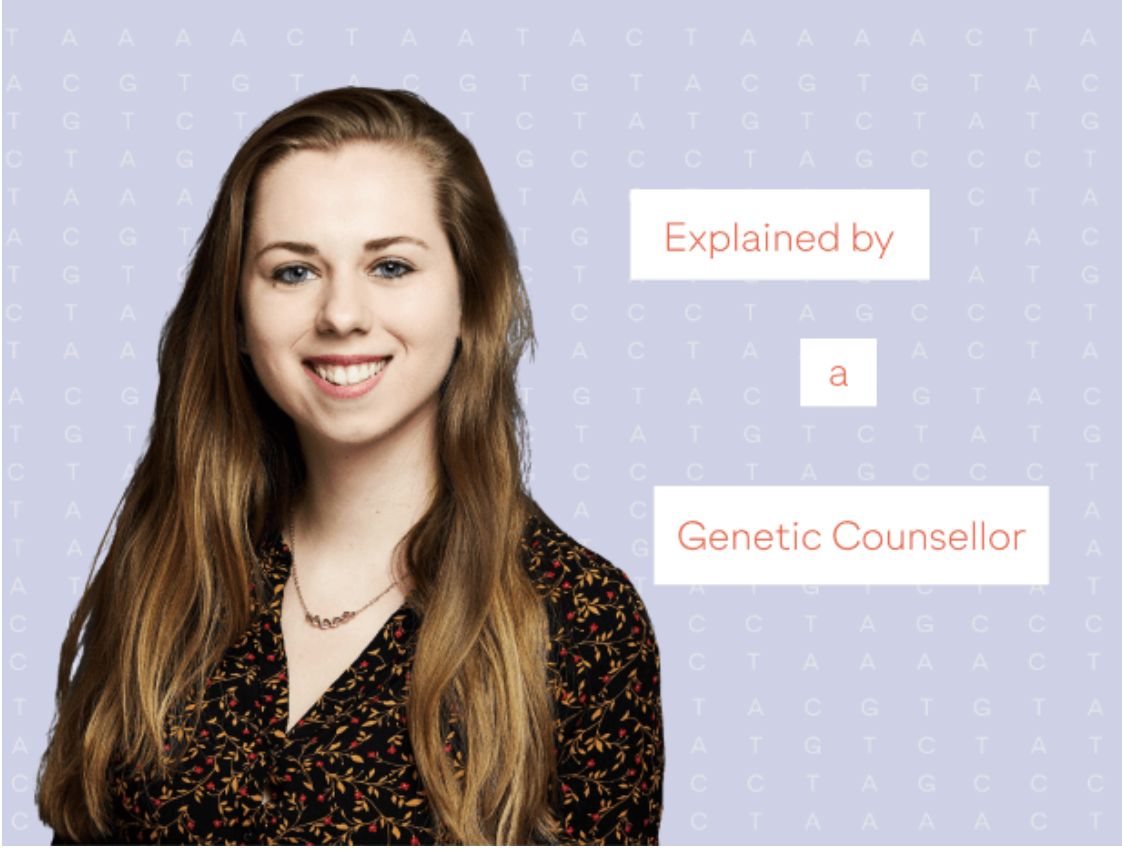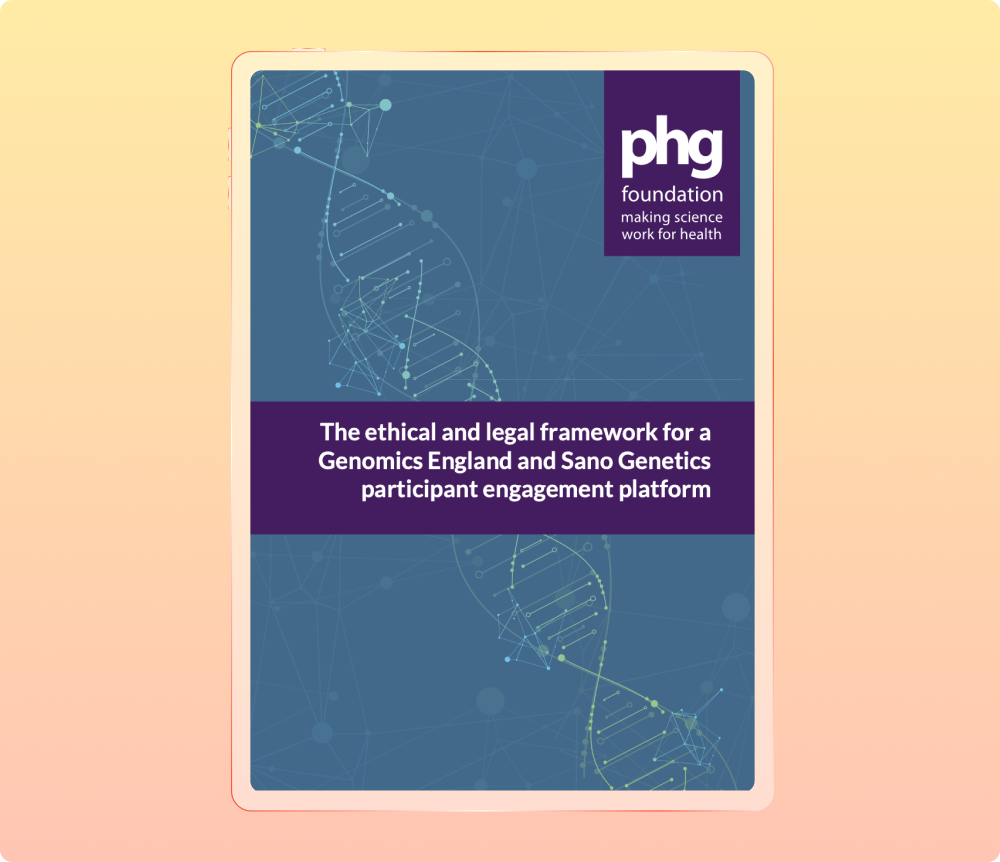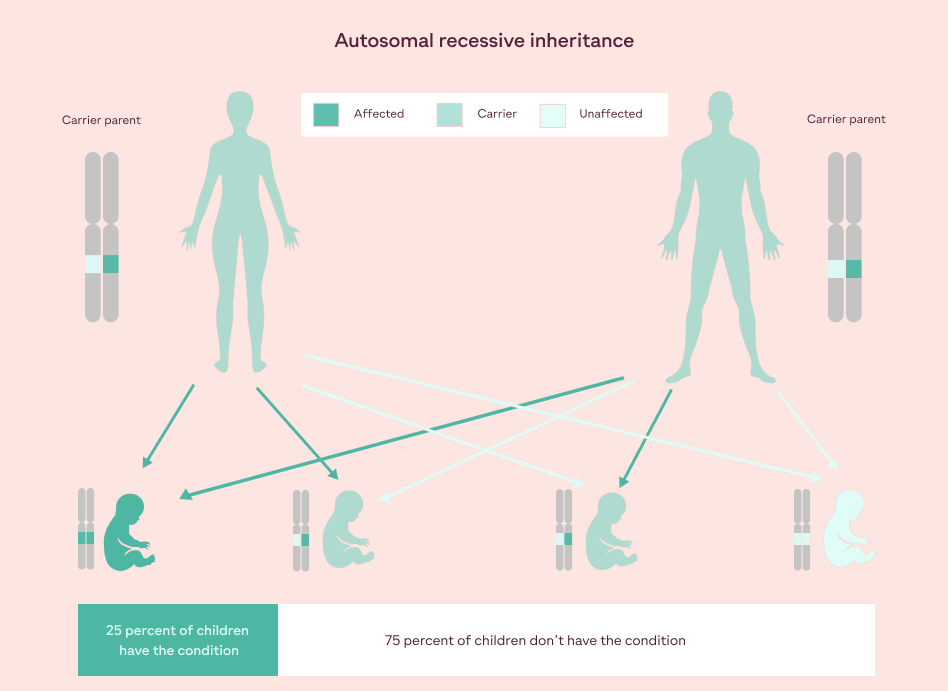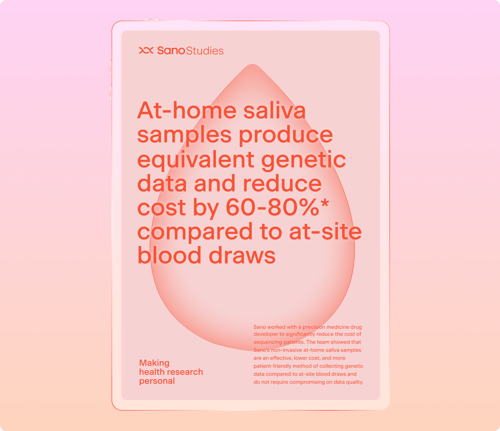
What is a genetic carrier?
Genetic counsellor Kira Dineen explains how it's possible for healthy people to pass on genetic disorders.
Kira is a certified genetic counsellor in a private practice in the USA, specialising in high risk obstetrics. She also serves as a National Society of Genetic Counselors’ Digital Ambassador and is the creator/host of the award winning DNA Today: A Genetics Podcast & Radio Show.
The ethical and legal framework for a Genomics England and Sano Genetics participant engagement platform

What is a carrier?
Humans have two copies of every gene, one inherited from each biological parent. A carrier is a person who has one working copy of a gene and one non-working copy of a gene. This autosomal recessive pattern means that as long as a person has one working copy of a gene, they are generally healthy. On the other hand, if a person has two non-working copies, they will have the associated condition.
Knowing if a person is a carrier becomes important when having children, because parents can potentially pass down the non-working version of a gene to a child. In a case where both parents unknowingly each have one copy of a non-working gene (as mentioned above, people don’t usually know if they have a single non-working copy because, in most cases, this doesn’t usually affect a person’s health). If the child were to inherit both of these non-working copies (one from each parent), then they would inherit the genetic condition associated with that particular gene.

Which conditions can be ‘carried’?
Scientists have identified hundreds of disorders that can be inherited in this autosomal recessive pattern, where both parents need to be carriers for a child to have a disorder. Some of the most well known conditions are cystic fibrosis, sickle cell disease, and Tays-sachs. It is also worth noting there are a few conditions that are inherited in a different pattern, however the vast majority are autosomal recessive.
How common is it to be a carrier?
Most people are a carrier of at least one genetic disease. If you learn one of your relatives, like a sibling or a parent, is a carrier of a condition there is a higher likelihood that you are also a carrier of that condition. About one in 22 couples are a carrier of the same condition. The good news is if a couple are carriers of different conditions there is a very low risk of their children inheriting one of the diseases.
What is the chance of my child inheriting an autosomal recessive genetic condition?
If both parents are carriers of the same disorder, there is a one in four chance of a child inheriting the disorder. Breaking this down, there is a 50 percent (half) chance of the first parent passing on their non-working copy of the gene and a 50 percent(half) chance of the other parent passing on their non-working copy of the gene. So, by multiplying ½ and ½ we end up with a ¼ (25 percent) chance of the child inheriting both non-working copies and therefore inheriting the condition.
What if my kids are healthy? Is there a chance my future children could inherit a genetic condition?
People can be a carrier of a genetic disease even if they already have healthy children. Both parents need to be carriers of this type of genetic condition to pass it onto their child; as explained above, there is a 25 percent chance the child will inherit the condition. This means there is a 75 percent chance of their child not inheriting the condition. Therefore, it is possible for couples to be a carrier of the same condition and have only healthy children.
How can I find out if I am a carrier?
Carrier screening is a test used to determine if a person is a carrier of a genetic condition. Healthcare providers like prenatal genetic counsellors, obstetricians, and nurses can order the testing or help you find someone who can. Carrier screening requires either a blood or saliva sample and results are typically reported in about two weeks.
Should I get carrier screening? If so, when should I get it?
All people who are thinking about having biological children or who are currently pregnant should consider having carrier screening. The best time to have carrier screening is prior to conception. If a couple finds out they are a carrier of the same condition, they have the option to explore other pathways to parenthood including
embryo screening to implant ones that will not inherit the disorder. However, most people get carrier screening during a pregnancy.
I had negative/normal carrier screening, should my partner be tested?
The short answer is no. If a person’s carrier screening does not find them to be a carrier then there is no need to test their partner. In order for a child to inherit a genetic condition, both parents need to be carriers of the same condition.
I had carrier screening years ago, should I repeat it?
Carrier screening provides life-lasting information about an individual's reproductive risk for the chances of their child inheriting a genetic condition. However, there are two aspects of carrier screening that improve over time.
The first is the number of conditions being screened for; in the early years of carrier screening only a handful of conditions were analysed. Now there are hundreds of conditions you can be screened for. The amount of conditions ordered will differ depending on who is ordering your testing. Some healthcare providers only look at a couple conditions and others will look at over 500. If you have been screened in the past it’s worth checking how many conditions were included in your screening and if you want to look at additional conditions.
The second aspect of carrier screening that has improved over time is the ability to identify if a given change in a gene is problematic. In the lab the sample is used to read a person's genes and identify and isolate genetic changes that may cause genes not to work correctly. Sometimes scientists will identify a change in a gene that is not yet fully understood (these are called “variants of uncertain significance” or a VUS). In these cases more data is needed to figure out if the change causes the gene not to function correctly or if it actually has no effect.
It’s also important to note that if someone is having children with a different partner, carrier screening should be revisited. If someone is a carrier of a condition and their previous partner was not a carrier of that condition, there was a low risk of their children inheriting the related genetic condition. However, with a new partner it is recommended to check if they are also a carrier of that condition to understand the risk for future pregnancies.
Why does the test ask for my ethnicity?
The accuracy of the test differs between ethnicities. This is a major issue in all genetic testing. There is more data for people of European descent which, as explored above, means it is easier for scientists to understand if a change in a gene is problematic or benign. To eliminate this disparity in genetics, more genetic data from people of all ethnicities needs to be collected. This will help scientists understand the effect of genetic changes in other populations Because of the high volume of available data for people of European descent, scientists can more confidently report that someone is or is not a carrier of a condition.
There are also certain genetic disorders that are more prevalent in specific populations. For example, people of European descent are more likely to be a carrier of cystic fibrosis while people of asian descent are more likely to be a carrier of alpha or beta thalassemia.
Can carriers experience symptoms of a genetic disease?
Carriers of the vast majority of genetic conditions are healthy. There are a few conditions where carriers can exhibit symptoms. Some of these conditions are Fragile X, Duchenne/Becker Muscular Dystrophy (DMD/BMD), Familial Mediterranean Fever (FMF), and Gaucher disease.
When to get carrier screening
So, let’s recap. A carrier is someone who has one working copy of a gene and one non-working copy of a gene. For most conditions, both you and your partner (or sperm/egg donor) need to be carriers of the same condition for there to be a risk for your child. Remember, in these cases there is a 25 percent chance a child inherits a non-working copy from each parent and then has the condition.
Most people who are a carrier are healthy and do not have a family history of the condition. People can find out if they are a carrier through their healthcare provider in about 2 weeks through carrier screening, which requires blood or saliva samples to be analysed in a laboratory. The more conditions screened for, the higher chance you will be found to be a carrier.
What’s my recommendation as a prenatal genetic counsellor? If you are thinking about having a child (or another child), considering carrier screening. The best time to have carrier screening is prior to conception. Why? Alternative pathways to parenthood can be explored including IVF to select an embryo that will not be affected by the condition. But, you then might ask me, “What if I am already pregnant?” Carrier screening can still be valuable information. In reality most people have carrier screening during pregnancy since this is when the testing is typically offered. If you and your partner are found to be carriers of the same condition, then you have the option for invasive testing to find out if the pregnancy inherited the condition.
Get in touch
We’ll respond to you within one working day

